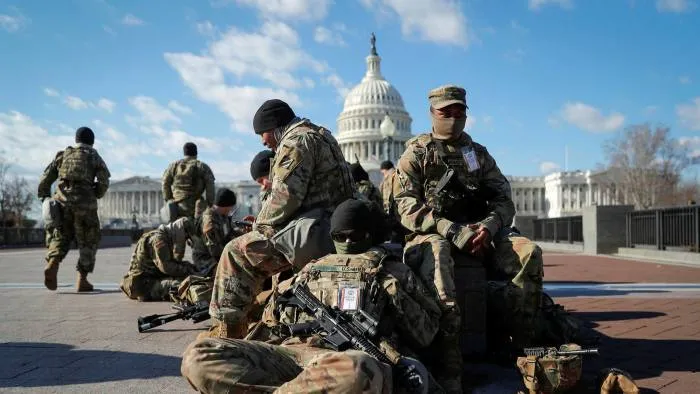
Perhaps the only inauguration to compare with the massive security surrounding Joe Biden’s was that of Abraham Lincoln in 1861. On the eve of the US civil war, America’s newly elected president had to dodge and weave his way through slave state territory to reach America’s capital. Unlike Lincoln, who arrived by train incognito in the middle of the night, Mr Biden cancelled his ceremonial arrival in Washington on Amtrak — a journey he took every day for more than three decades. The security risk was just too great.
But Mr Biden has gone ahead with other risks. Against the advice of some in the security agencies, Mr Biden will be sworn into office on the steps of the Capitol — the same building that was stormed two weeks ago by Donald Trump’s “Stop the Steal” mob. Along with former presidents Barack Obama, George W Bush and Bill Clinton, Mr Biden will lay a wreath at the tomb of the Unknown Soldier across the Potomac river in Arlington cemetery after the inauguration.
In a sign of heightened concern, officials have conducted background checks on the 25,000 soldiers who will patrol and guard Washington’s vast green zone. The day before the inauguration, two National Guard soldiers were removed from duty because of suspected links to extreme rightwing groups.
“I have to question the wisdom of holding these events outside — it seems like an unnecessary risk,” said Michael Beschloss, a leading presidential historian. “It is questionable whether the ‘business-as-usual’ image Biden wants to project outweighs the non-trivial threat to his security and other dignitaries.”
In 1861, the US army were on the lookout for the infamous “plug-uglies” — a nativist criminal network that wanted to assassinate Lincoln. He made it through the day unscathed. At least once during his presidency, an enemy sharpshooter penetrated his tall hat. He eventually fell to an assassin’s bullet in 1865.
The Secret Service, the FBI and the DC police have been closely monitoring encrypted communications among the panoply of far-right groups that wish to prevent Mr Biden’s swearing-in — or who view his presidency as illegitimate. Of these, the Oath Keepers, the three percenters, the Proud Boys and various QAnon-inspired groups are prominent.
Even without the security dimension, Mr Biden’s inauguration would have been largely virtual. With the US pandemic death toll continuing to mount, there would have been no traditional crowds lining Pennsylvania Avenue between Capitol Hill and the White House.
Nor will there be any ceremonial handover between Mr Trump and Mr Biden. The last time a departing president refused to attend the swearing-in of his successor was in 1869 when Andrew Johnson boycotted the inauguration of Ulysses S. Grant. “Johnson had just been impeached, he was angry at having lost the election and he didn’t have many friends left,” said Mr Beschloss. “Does that remind you of anyone?”
The healing tone and content of Mr Biden’s address is likely to strike a sharp contrast to Mr Trump’s dystopian “American carnage” speech four years ago. So, too, will the atmosphere. Mr Trump’s highly-litigated inaugural committee faces court hearings later this year. The District of Columbia’s attorney-general has accused Mr Trump’s team of having directed a large chunk of the $107m it raised for the event to pay inflated prices at the Trump International Hotel and other arms of the Trump Organisation.
“The experience was the most shocking of my life,” said Stephanie Winston Wolkoff, who was a key player on the Trump inaugural committee, and who, as a former employee at Vogue, had befriended Melania Trump when she appeared on the magazine’s cover in 2003. “The level of self-dealing and deceit that I saw in Trump’s inaugural celebrations was a foretaste of what America would go through for the next four years.”
Mr Biden’s inauguration will also strike a very different kind of contrast to Barack Obama’s first one in 2009, which drew crowds of 1.9m in front of a glinting snow-covered foreground. Steven Spielberg, the Hollywood director, remarked that it would be impossible to create a film set like that.
Even without the heightened security tensions and the pandemic, this occasion would have been different. Mr Biden is not known for his strong oratory. Nor is he known for his brevity. The most celebrated inaugural speeches have tended to be the shortest: George Washington in 1789, Lincoln in 1861 and 1865 and John F. Kennedy in 1961.
Kennedy’s “ask not what your country can do for you” speech is what history best remembers about his event. But it was also marred by the appearance of smoke from under the lectern when Cardinal Richard Cushing, the archbishop of Boston, was giving his blessing. The cardinal later said that he had strung out his prayer so as to protect Kennedy from a possible bomb blast. In the event, the smoke turned out to been caused by an electrical fault.
Cushing’s blessing went on for longer than JFK’s address. Although the outgoing president, Dwight D. Eisenhower, was no fan of Kennedy, the jovial atmosphere around that event, and most other inaugurations, could not be further removed from Mr Biden’s.
America’s 46th president will be hemmed in by a vast cage of protective fortifications more redolent of a country at war than a peaceful democracy. The man who made this all possible — Mr Trump — will have left the city several hours earlier for his Mar-a-Lago club in Florida.
The departing president and first lady have not even upheld the tradition of showing the incoming first family around the White House. Nor has Mr Trump formally conceded defeat. “Melania didn’t even invite Jill Biden around for tea,” said Ms Wolkoff. “They are leaving office as they entered it: with no grace and no respect.”





















